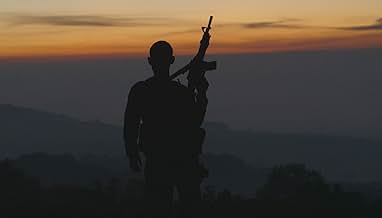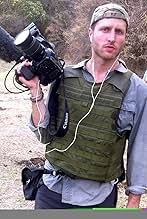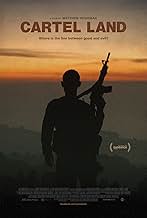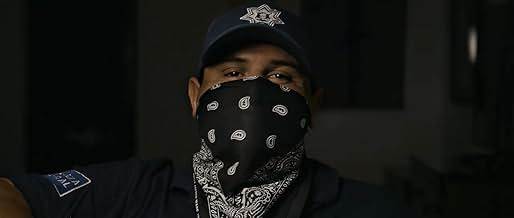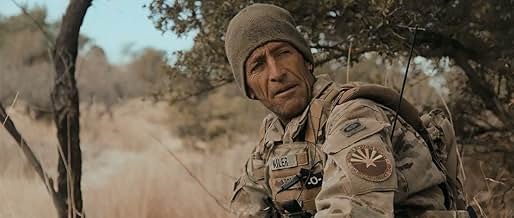Filmmaker Matthew Heineman examines the state of the ongoing drug problem along the U.S.-Mexican border.Filmmaker Matthew Heineman examines the state of the ongoing drug problem along the U.S.-Mexican border.Filmmaker Matthew Heineman examines the state of the ongoing drug problem along the U.S.-Mexican border.
- Nominated for 1 Oscar
- 19 wins & 38 nominations total
Nicolás Sierra
- Self
- (as as Nicolás Sierra 'El Gordo')
Alfredo Castillo Cervantes
- Self - Mexican political
- (as Alfredo Castillo)
María Imilse Arrué
- Self
- (as María Imilse)
Featured reviews
This documentary is about Mexico and cartels, but it is also about vigilantism in general. Is it OK to take the law into your own hands? Does this freedom corrupt? The documentary explores two (related) instances of vigilantism, and it does so in a critical, but nuanced way. It reflects upon the motives of the people involved, and their situation. This exploration is what really makes this documentary great. It throws some light on the situation in Mexico in a way that is both thrilling and heartbreaking - but by focusing on the acts of the vigilantes, the documentary becomes timeless.
The people behind this went to great lengths to get some really(!) impressive footage. How they convinced people involved to let them film all of this is beyond me.
A warning though: There were some scenes here where I had to look away because of the images shown.
The people behind this went to great lengths to get some really(!) impressive footage. How they convinced people involved to let them film all of this is beyond me.
A warning though: There were some scenes here where I had to look away because of the images shown.
The Mexican side of this documentary is more than intriguing. What people go through is incredible. The patrol they created to fight against crime is something that most people probably stand behind and support too. The Arizona patrol on the other hand? A whole different beast (quite literally, especially considering the views they express and because it's not the same situation as across the border).
Having said that, and if you are able to judge on your own and not take some things that are being said as more than they are: there is a real tension that builds up and even concerns families, bullying and trying to bring order where order is not wanted by the government (at least the current government in Mexico that is). And that's the thing: While the documentary takes a stance against drug and criminality, it almost embraces racism on the other hand ... either stay neutral or really make a good point
Having said that, and if you are able to judge on your own and not take some things that are being said as more than they are: there is a real tension that builds up and even concerns families, bullying and trying to bring order where order is not wanted by the government (at least the current government in Mexico that is). And that's the thing: While the documentary takes a stance against drug and criminality, it almost embraces racism on the other hand ... either stay neutral or really make a good point
Are vigilantes reluctant heroes taking up arms to defend their communities? Or men of violence looking for a cause in which to fight? Can a band of local activists protect the people against a corrupt government? Or is an self-appointed institution always doomed, by its very nature, to be guilty of the same crimes it is founded to eliminate? Where does the greatest threat to a popular movement come from - the personal failings of a charismatic leader who can satisfy, but only for a moment, the people's desire for a saviour, or in the slime-ball sellouts who would replace him? These questions are deftly posed by 'Cartel Land', a documentary about the drug trade that focuses on the odd right-wing Minutemen of southern Arizona, who seem to feel it necessary to patrol the Mexican border for reasons unapparent, and the Atodefensas of central Mexico, a self-defence force fighting the drug cartels out of a self-evident desire for mere survival but which might possibly be just a new cartel in the making. The only certain conclusion from Matthew Heiman's bleak, compelling film is that the war on drugs is a war that can only be lost.
This moving and compelling documentary paints a vivid picture of the tragic situation involving the cartels, police, military, government, and citizens of Mexico. This story is too little known north of the border, and that's why this documentary is important and should be seen. The director's bravery in obtaining some amazing footage is to be commended.
However, in my opinion the filmmaker has made a serious and even offensive misstep in trying to create a parallel between the vigilantes of the Autodefensas and the vigilantes of the Arizona Border Recon. Quoting from the doc's website, the premise is that these groups "vie to bring their own brand of justice to a society where institutions have failed."
It's abundantly clear that in Mexico, to put it as neutrally as possible, institutions (government, police, military) have failed to protect citizens from cartel- sponsored violence. The tragic consequences of this failure are made disturbingly real in the film.
However, the idea that U.S. government, police, and military have failed to protect the citizens of Arizona from cartel-sponsored violence is just absurd. Worse, by comparing a flawed Mexican leader who is apparently sincerely trying to address a horrific situation to a flawed American "leader" who is off on some crackpot right-wing conspiracy theory where the danger is mostly in his head, the film ends up insulting the actual pain and suffering experienced by the people of Mexico. However much the Arizona guy wants to say he's really focusing on the cartel's activity in the Arizona desert (how does that work, again?), his true motive is to stop people from crossing the border because he has an anti-immigration ax to grind. However you feel about immigration, U.S.-based anti- immigrant vigilantism is not analogous to the motives or efforts of the Autodefensas. Comparing the two insults the Mexican people's suffering and the Autodefensas courage, however flawed their leaders and unsuccessful their efforts may be.
If the filmmaker wanted to bring in important information from the U.S. side of the border, he might have tried providing some information about how our government's "War on Drugs" has paralleled the cartel's rise (coincidence?), or the blood that's on our hands because we're the ones buying the drugs.
Instead, he makes a false parallel with a group of anti-immigrant wingnuts. If you want to make a documentary to show that anti- immigrant wingnuts are people too, go ahead, but don't try to compare the Arizona Border Recon to the Autodefensas. That's not an intellectually fascinating parallel, as the filmmaker apparently believes. It's just pretentious and, really, disgusting.
However, in my opinion the filmmaker has made a serious and even offensive misstep in trying to create a parallel between the vigilantes of the Autodefensas and the vigilantes of the Arizona Border Recon. Quoting from the doc's website, the premise is that these groups "vie to bring their own brand of justice to a society where institutions have failed."
It's abundantly clear that in Mexico, to put it as neutrally as possible, institutions (government, police, military) have failed to protect citizens from cartel- sponsored violence. The tragic consequences of this failure are made disturbingly real in the film.
However, the idea that U.S. government, police, and military have failed to protect the citizens of Arizona from cartel-sponsored violence is just absurd. Worse, by comparing a flawed Mexican leader who is apparently sincerely trying to address a horrific situation to a flawed American "leader" who is off on some crackpot right-wing conspiracy theory where the danger is mostly in his head, the film ends up insulting the actual pain and suffering experienced by the people of Mexico. However much the Arizona guy wants to say he's really focusing on the cartel's activity in the Arizona desert (how does that work, again?), his true motive is to stop people from crossing the border because he has an anti-immigration ax to grind. However you feel about immigration, U.S.-based anti- immigrant vigilantism is not analogous to the motives or efforts of the Autodefensas. Comparing the two insults the Mexican people's suffering and the Autodefensas courage, however flawed their leaders and unsuccessful their efforts may be.
If the filmmaker wanted to bring in important information from the U.S. side of the border, he might have tried providing some information about how our government's "War on Drugs" has paralleled the cartel's rise (coincidence?), or the blood that's on our hands because we're the ones buying the drugs.
Instead, he makes a false parallel with a group of anti-immigrant wingnuts. If you want to make a documentary to show that anti- immigrant wingnuts are people too, go ahead, but don't try to compare the Arizona Border Recon to the Autodefensas. That's not an intellectually fascinating parallel, as the filmmaker apparently believes. It's just pretentious and, really, disgusting.
Review: What a brilliant documentary! It really did seem like it was a feature film because it's full of action and intense drama. The director, Matthew Heineman, was lucky to gain the trust of Dr. José Mireles and Tim "Nailer" Foley, to go behind the scenes and film the gruesome problems in the Mexican state of Michoacan and the Arizona border, which is used by the drug cartels to bring drugs into America. Both stories involve heavy corruption, kidnap, horrifying murder, rape and black mail. Matthew put together enough material to tell the terrifying story about the drug cartels who will kill anybody who step in there way. Tim is an ex veteran who suffered abuse from his father and left home at the early age of 15. After working in various jobs and losing his house due to the credit crunch, he started to work alongside immigrants, who worked illegally and didn't pay any taxes. He then decided to use his savings to put together an elite force called the Arizona Border Recon in Arizona's Altar Valley, to stop the drug cartels from bringing there drugs into America and to stop the war causing any problems across the border. His small force use heavy artillery and patrol during day and night to protect his home and infiltrate the cartels various methods of trafficking drugs. As there isn't any laws to protect them, they basically take matters into there own hands and risk there life's for there country and to make sure that things don't get out of hand. While Tim is battling against the cartels, who are using the newest technology to communicate, Dr. José Mireles is also battling against the cartels but his war is to protect Michoacan and to gain control of the various towns which have many violent gang members, called the Knight Templars, who are causing havoc in there communities. After giving speeches in the various towns, he manages to put together a force called the Autodefensas, who use heavy artillery and group together in numbers to get the perpetrators out of the many villages. He successfully cleans up many of the small towns and he becomes highly respected around Michoacan. He then ends up in a plane crash, which paralysed a side of his face and seriously damages his back, so he takes time out from the Autodefensas and goes into hiding because he doesn't know if the crash was a hit from the cartels. On the anniversary of the Autodefensas, José comes out of hiding and takes back control of his elite force but everything has got out of control and a lot of the Autodefensas are using there powers to do bad things. As they haven't got the right to have guns and apply force around Michoacan, the government step in and build there own force, which pushes José out of control. All of his fellow workers join the government force because they are allowed to use guns by law and Jose's life becomes in danger because he has broken so many laws when he was in control. When they eventually catch up with José, they put him in a Federal Centre for Social Re-adaptation in Hermosillo, Sonora. Although he still gains support from the villagers, he has basically become a political prisoner who is kept behind bars to silence him and take full control of his elite force. It has all the makings for a brilliant film but as this is a documentary about true events, I found it thrilling and quite emotional, especially when you hear what some of the community went through. The story that was told by the lady who watched her husband being burnt to death, was awful and it really shows how far these cartels are willing to go, to bring fear into people's life's. There also are some intense shoot-outs which must have been extremely scary for the director, who was in the heart of the action. Anyway, this movie definitely gave a graphic insight into a world which I totally didn't know existed and right from the beginning, when the members of the cartels are cooking the "Meth", I was glued to the TV until the end. Great!
Round-Up: This brilliant documentary was put together by Matthew Heineman who brought you Overcoming The Storm, which is about several residents returning to there homes in New Orleans after hurricane Katrina, Our Time, which is about 4 youths who travel across America to ask there peers serious questions about life in America today and Escape Fire: The Fight Of Rescue American Healthcare, which uncovers the U.S. Healthcare systems true design. I personally would watch Matthew's other documentaries because he really did get to the heart of the problem with this movie and put his life on the line, to the point were he didn't put on his bullet proof vest during one of the shoot-outs because he wanted to catch all of the action on camera. The movie did make me investigate what really did happen to José, who is still in prison but I did find it a bit weird that no one looked into the camera during the scenes in the various villages and the shoot-outs. That did make me question if the documentary was real but when I watched the bonus material on the DVD, I realised that these events really did happen. The cartels value for life did shock me and I can't imagine how it must be to live your life in fear, 24 hours a day. I think you can tell that I really enjoyed this film and I hope that it gets the recognition that it deserves.
Budget: N/A Worldwide Gross: $1.1million
I recommend this movie to people who are into their documentary/action/drama movies about a physician in Michoacan, Mexico, who leads a citizen uprising against the drug cartel that has wreaked havoc on the region for years. 8/10
Round-Up: This brilliant documentary was put together by Matthew Heineman who brought you Overcoming The Storm, which is about several residents returning to there homes in New Orleans after hurricane Katrina, Our Time, which is about 4 youths who travel across America to ask there peers serious questions about life in America today and Escape Fire: The Fight Of Rescue American Healthcare, which uncovers the U.S. Healthcare systems true design. I personally would watch Matthew's other documentaries because he really did get to the heart of the problem with this movie and put his life on the line, to the point were he didn't put on his bullet proof vest during one of the shoot-outs because he wanted to catch all of the action on camera. The movie did make me investigate what really did happen to José, who is still in prison but I did find it a bit weird that no one looked into the camera during the scenes in the various villages and the shoot-outs. That did make me question if the documentary was real but when I watched the bonus material on the DVD, I realised that these events really did happen. The cartels value for life did shock me and I can't imagine how it must be to live your life in fear, 24 hours a day. I think you can tell that I really enjoyed this film and I hope that it gets the recognition that it deserves.
Budget: N/A Worldwide Gross: $1.1million
I recommend this movie to people who are into their documentary/action/drama movies about a physician in Michoacan, Mexico, who leads a citizen uprising against the drug cartel that has wreaked havoc on the region for years. 8/10
Did you know
- TriviaThe Autodefensas group shown in the film was created by civilians to stand up against the cartels because the government is overrun with corruption. Individuals speak about how little the Mexican president (Enrique Peña Nieto) is doing. In the film, the Autodefensas is shown celebrating its one year anniversary on February 24, 2014. On that exact same day, TIME Magazine ran an issue with the Mexican President Enrique Peña Nieto with the headline "Saving Mexico." Nieto reportedly paid TIME $44,000 for this cover article coincidentally released on the same day as the Autodefensas anniversary.
- Quotes
José Manuel 'El Doctor' Mireles: Get everything you can out of him, and then put him in the ground.
- SoundtracksEn Las Calles
Written by H. Scott Salinas and Jose Cancela
- How long is Cartel Land?Powered by Alexa
Details
Box office
- Gross US & Canada
- $704,352
- Opening weekend US & Canada
- $15,581
- Jul 5, 2015
- Gross worldwide
- $1,145,923
- Runtime
- 1h 40m(100 min)
- Color
- Aspect ratio
- 2.35 : 1
Contribute to this page
Suggest an edit or add missing content







